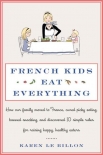French Kids Eat Everything by Karen Billon (interesting books to read for teens txt) 📗

- Author: Karen Billon
Book online «French Kids Eat Everything by Karen Billon (interesting books to read for teens txt) 📗». Author Karen Billon
Madame looked encouraged. She referred enthusiastically to French research on “sensory appreciation” and its importance for healthy eating habits. Schools, she proudly noted, used these research results in their curriculum. In classroom lessons, students learned to reflect on food and to speak about their thoughts and feelings. Once this happened, she continued, children began to develop richer ideas about food. The same food—avocado, for example—might be prepared three or four different ways and offered to the children, who would learn about the different culinary expressions and about their own sensory skills. Spices were introduced in older grades, where children were also asked to critically analyze media messages about food, and learned about France’s patrimoine culinaire (culinary heritage) as part of their social studies lessons. That even sounded like it would be useful for me.
The lessons then moved on to introduce complex aromas, explore food preferences, and prepare dishes (usually regional specialties), finishing with Tasting Week’s grand finale: a repas de fête. This is a difficult concept to translate but is best understood as a celebratory meal at which eating is the primary vehicle for celebrating. All children had to go through this process together, Madame insisted. For those really interested, special after-school classes were available (like the summer cooking camps that our older nieces and nephews attended). The local government had even organized a field trip the year before, to the Epicurium—the world’s first museum dedicated to fruits and vegetables—in the heart of the southern French city of Avignon.
“So,” concluded Madame triumphantly, “Sophie will have a wonderful time eating at school, just like everyone else.” I didn’t know what to say. All of this sounded like fun, but I still didn’t think it was going to change Sophie’s mind about beet salad.
“That does sound wonderful,” I stammered, feeling as if I was on thin ice. Gathering my courage, I insisted: “I don’t think this will work for Sophie. She needs to eat well in order to learn well. She needs to snack at least twice a day. She can’t concentrate when she’s hungry. And I’m not sure she’ll be able to handle the food in the cantine. Could she not bring her own lunch, or at least her own snacks?”
“NO!” came the reply. It was clear there was no room for negotiation. “Snacking provides poor nutrition, which doesn’t help children learn,” said Madame, with a firm tone. “It’s my job to teach healthy eating habits to all of my students.” For Madame, it was clear that learning to eat the French way was mandatory.
I must have looked mutinous because Madame stopped at the exit to add a couple more points. Throughout the year, Sophie would come home with fun ideas about food, Madame promised. The children would grow their own vegetables in special plots set aside in the schoolyard. The class would go on field trips to the local market, which was only a five-minute walk away. And they’d blend studies of food with other subjects, like science, particularly in their module on snails.
Madame must have noticed my reaction at her mention of snails, for she stopped her monologue to suggest that if I had any other questions I should perhaps see the school’s psychological counselor.
I froze in alarm. “Isn’t Sophie a bit young to see a counselor?” I gasped out weakly.
Silence.
“The counselor would be for you,” Madame finally said before turning away to welcome the arriving students.
My husband laughed when I told him this later. “French people don’t get anxious about food,” he said. “Most believe that children’s eating problems are due to the parents.” I found this insulting. Did he think that I had caused Sophie’s eating problems? It turns out he did (sort of), and we ended up having one of our first big fights of our year in France.
“I’m not anxious,” I told him. “I’m simply protecting Sophie.”
“From what?” he replied. I didn’t have a good answer.
The bell rang, and the students streamed into class towing Sophie in their wake. I was left clutching her brown paper lunch bag and wondering what would come next.
The answer was: nothing. No special allowances would be made for Sophie, who would have to adapt, and the sooner the better. The purpose of school was to educate Sophie, in spite of me. No one would pander to her or to her parents. Or, in my case, to her anxious foreign parent.
None of this made me feel very comfortable. But, as I quickly learned, French schools are not interested in making parents feel comfortable. They have a punitive model of education (which applies equally to both parents and children who get out of line). When I learned that one of Sophie’s classmates was getting detentions because she didn’t finish her in-class work fast enough (in kindergarten!), I started to realize what we were up against. But I felt powerless to do anything about it.
“Why do they





Comments (0)